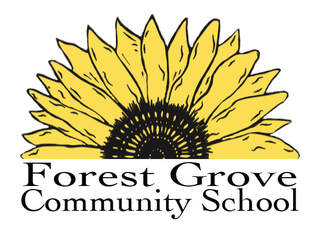Mission, Vision & Values
Forest Grove Community School Mission, Vision & Core Values
Mission
FGCS fosters scholarship, stewardship and citizenship through engaging, relevant and active learning to help our students become educated and caring community members. Through classroom and real-world experiences we honor individual student needs and abilities, strive to educate the whole child, and emphasize student growth.
Vision
Helping all students develop as scholars, stewards and citizens through active learning rooted in the community and the natural world.
Core Values
To educate the whole child, we have created a culture that includes the following core components, which reflect our values and beliefs and provide the foundation to our scholarship, stewardship and citizenship programs.
Active, Relevant, & Engaging Learning
We believe that the best pathway to understanding is to ‘learn by doing’ through engaging projects and learning activities that are meaningful to students. Therefore we…
- Develop standards-based, integrated projects through which students are involved with and contribute to our community in an authentic and empowering way.
- Get students out of the classroom often through regular Out and Abouts.
- Create experiences that foster a connection to place in students.
- Work with community partners to provide relevant experiences for our students.
- Promote citizenship and stewardship skills through active participation in our community and environment. Adopt instructional approaches and curricula that emphasize active learning.
- Strive to provide students with choice, voice, outlets for investigation, and opportunities for interaction.
Empowerment & Ownership
We believe that in order to develop academic and social-emotional skills, students need to be active participants in their own learning. Furthermore, we believe that we all have the potential and the responsibility to do our part in making the world a better place. Therefore we…
- Teach social-emotional skills relating to self-regulation, conflict resolution, and accountability.
- Use restorative justice approaches through which students are active participants in repairing harm.
- Incorporate reflection practices in our learning so that students regularly take stock of their progress.
- Have goal-setting and student-led conferences, which place students at the center of their education.
- Give students opportunities to make a difference in their community and world (citizenship & stewardship practices).
- Create classrooms in which student voice is incorporated—students help create rules and expectations and classroom meetings happen regularly so students can address concerns.
- Teach, model, and practice scholarship, stewardship and citizenship in our daily lives.
Honoring the Individual
We believe students are unique, complex, and beautiful; that their variable backgrounds and life experiences enrich our community; that they develop at different rates; and that they deserve our care, encouragement, and full respect. Therefore we…
- Embrace and encourage students’ unique interests, skills, experiences, and talents.
- Differentiate teaching to meet students where they are.
- Teach perspective taking, active listening, and respectful communication.
- Use restorative justice practices to address conflicts and disruptive behavior by engaging students in a process that helps repair harm, restore relationships and build community.
- Listen to, observe, and seek to understand children in order to address lagging skills—social-emotional or academic.
- Encourage creativity, curiosity and academic achievement.
- Incorporate students’ backgrounds to enhance classroom learning and experience.
Growth & Improvement
We believe in nurturing a culture of continuous improvement in which staff, board, and students strive to be their best selves and actively engage in creating an enriching learning environment. Therefore we…
- Work to improve as professionals by setting goals, reflecting on our progress toward them, and incorporating relevant resources to help us grow and learn.
- Emphasize growth in children’s academic and social-emotional development and incorporate practices that focus on students’ individual strengths and skills.
- Use multiple sources of data to evaluate student growth and reject the position that a state test can be used to define a student’s learning.
- Use multiple sources of data to evaluate the school’s health and success.
- Invest in the improvement and upkeep of our physical spaces, incorporate stewardship practices into our classes, and model stewardship behaviors.
- Promote professional development and work collaboratively to improve our practice.
